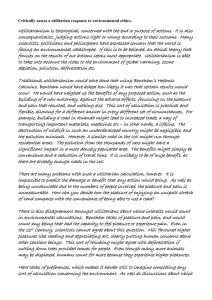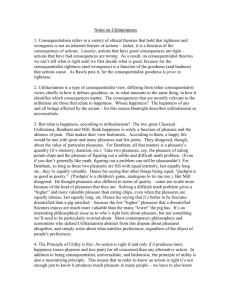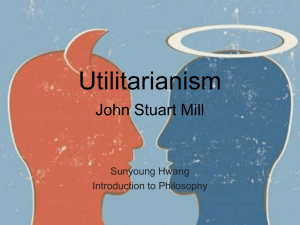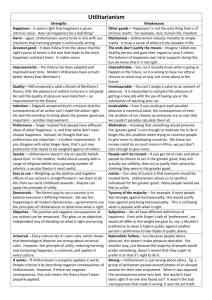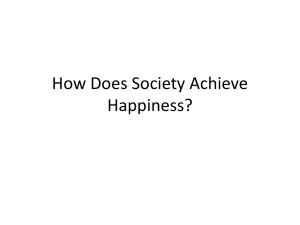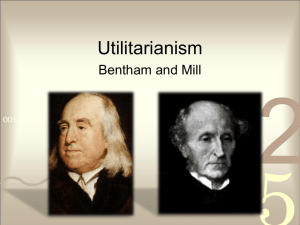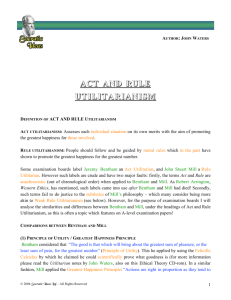Utilitarianism: Bentham – Hedonic Calculus Bentham
advertisement
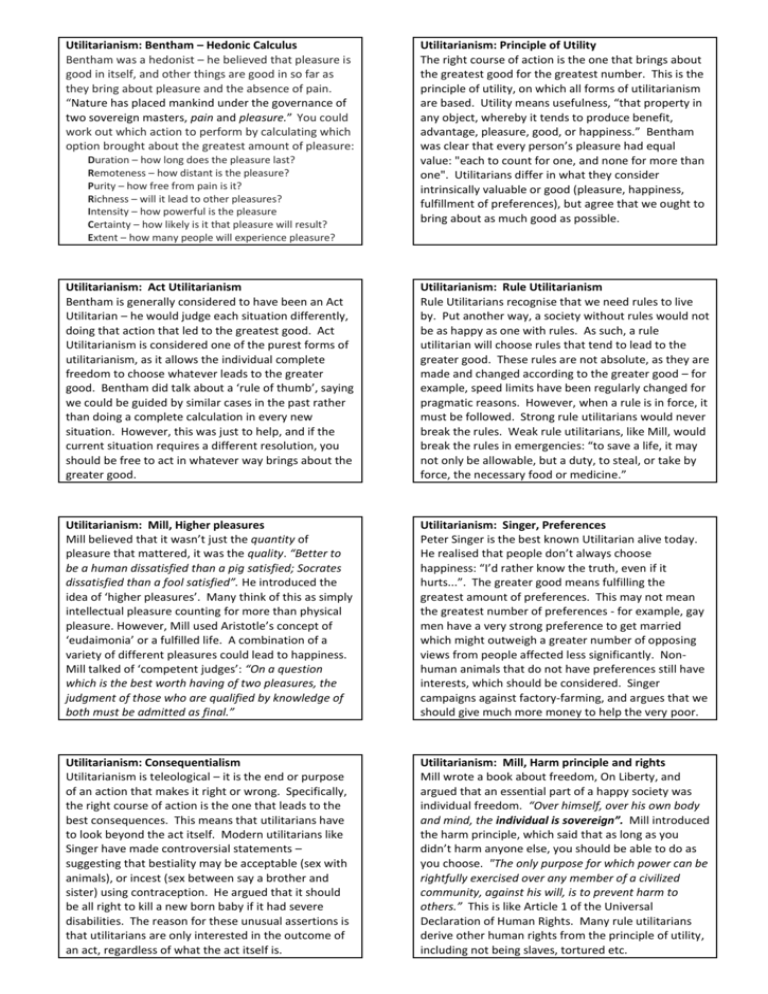
Utilitarianism: Bentham – Hedonic Calculus Bentham was a hedonist – he believed that pleasure is good in itself, and other things are good in so far as they bring about pleasure and the absence of pain. “Nature has placed mankind under the governance of two sovereign masters, pain and pleasure.” You could work out which action to perform by calculating which option brought about the greatest amount of pleasure: Duration – how long does the pleasure last? Remoteness – how distant is the pleasure? Purity – how free from pain is it? Richness – will it lead to other pleasures? Intensity – how powerful is the pleasure Certainty – how likely is it that pleasure will result? Extent – how many people will experience pleasure? Utilitarianism: Principle of Utility The right course of action is the one that brings about the greatest good for the greatest number. This is the principle of utility, on which all forms of utilitarianism are based. Utility means usefulness, “that property in any object, whereby it tends to produce benefit, advantage, pleasure, good, or happiness.” Bentham was clear that every person’s pleasure had equal value: "each to count for one, and none for more than one". Utilitarians differ in what they consider intrinsically valuable or good (pleasure, happiness, fulfillment of preferences), but agree that we ought to bring about as much good as possible. Utilitarianism: Act Utilitarianism Bentham is generally considered to have been an Act Utilitarian – he would judge each situation differently, doing that action that led to the greatest good. Act Utilitarianism is considered one of the purest forms of utilitarianism, as it allows the individual complete freedom to choose whatever leads to the greater good. Bentham did talk about a ‘rule of thumb’, saying we could be guided by similar cases in the past rather than doing a complete calculation in every new situation. However, this was just to help, and if the current situation requires a different resolution, you should be free to act in whatever way brings about the greater good. Utilitarianism: Rule Utilitarianism Rule Utilitarians recognise that we need rules to live by. Put another way, a society without rules would not be as happy as one with rules. As such, a rule utilitarian will choose rules that tend to lead to the greater good. These rules are not absolute, as they are made and changed according to the greater good – for example, speed limits have been regularly changed for pragmatic reasons. However, when a rule is in force, it must be followed. Strong rule utilitarians would never break the rules. Weak rule utilitarians, like Mill, would break the rules in emergencies: “to save a life, it may not only be allowable, but a duty, to steal, or take by force, the necessary food or medicine.” Utilitarianism: Mill, Higher pleasures Mill believed that it wasn’t just the quantity of pleasure that mattered, it was the quality. “Better to be a human dissatisfied than a pig satisfied; Socrates dissatisfied than a fool satisfied”. He introduced the idea of ‘higher pleasures’. Many think of this as simply intellectual pleasure counting for more than physical pleasure. However, Mill used Aristotle’s concept of ‘eudaimonia’ or a fulfilled life. A combination of a variety of different pleasures could lead to happiness. Mill talked of ‘competent judges’: “On a question which is the best worth having of two pleasures, the judgment of those who are qualified by knowledge of both must be admitted as final.” Utilitarianism: Singer, Preferences Peter Singer is the best known Utilitarian alive today. He realised that people don’t always choose happiness: “I’d rather know the truth, even if it hurts...”. The greater good means fulfilling the greatest amount of preferences. This may not mean the greatest number of preferences - for example, gay men have a very strong preference to get married which might outweigh a greater number of opposing views from people affected less significantly. Nonhuman animals that do not have preferences still have interests, which should be considered. Singer campaigns against factory-farming, and argues that we should give much more money to help the very poor. Utilitarianism: Consequentialism Utilitarianism is teleological – it is the end or purpose of an action that makes it right or wrong. Specifically, the right course of action is the one that leads to the best consequences. This means that utilitarians have to look beyond the act itself. Modern utilitarians like Singer have made controversial statements – suggesting that bestiality may be acceptable (sex with animals), or incest (sex between say a brother and sister) using contraception. He argued that it should be all right to kill a new born baby if it had severe disabilities. The reason for these unusual assertions is that utilitarians are only interested in the outcome of an act, regardless of what the act itself is. Utilitarianism: Mill, Harm principle and rights Mill wrote a book about freedom, On Liberty, and argued that an essential part of a happy society was individual freedom. “Over himself, over his own body and mind, the individual is sovereign”. Mill introduced the harm principle, which said that as long as you didn’t harm anyone else, you should be able to do as you choose. "The only purpose for which power can be rightfully exercised over any member of a civilized community, against his will, is to prevent harm to others.” This is like Article 1 of the Universal Declaration of Human Rights. Many rule utilitarians derive other human rights from the principle of utility, including not being slaves, tortured etc.
